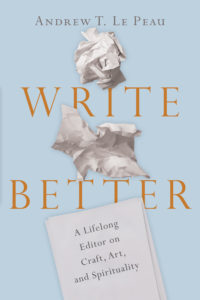Writing is hard work. So in Write Better I want to make the job easier, especially for nonfiction writers, and help them do it better. I’ve loved words, reading, and writing almost my whole life, and want to share what I’ve learned with others.
 Why Write Better when there are already many good books on writing? First, many books on writing are actually memoirs of the writing life without much help on how to write. Many other helpful books get into the details of grammar, punctuation, and very specific style issues without considering broader topics. Write Better instead considers the larger issues of craft and art in writing, offering practical strategies on a wide range of topics.
Why Write Better when there are already many good books on writing? First, many books on writing are actually memoirs of the writing life without much help on how to write. Many other helpful books get into the details of grammar, punctuation, and very specific style issues without considering broader topics. Write Better instead considers the larger issues of craft and art in writing, offering practical strategies on a wide range of topics.
Second, few books consider so deeply the spirituality of writing—that is, how the act of writing and publishing affects our life with God. The very personal and very public nature of writing can make us vulnerable in many ways. So I explore how knowing who we are and who we are in God make an enormous difference, as one example, when facing success or failure.
Here are just a few of the things you’ll learn from Write Better.
- Coming up with strong openings and closings can be difficult. I not only show the wide variety that are possible but offer very practical strategies for developing the best ones.
- Being creative is not the sole domain of people who seem to have especially creative personalities. It is for all of us. In the book I show how we can develop these skills by following some simple, concrete practices.
- Using story and narrative is vital for nonfiction writing, not just for fiction. You’ll find how to use narrative to touch not just the mind but the whole person, moving readers not just emotionally but to live differently.
- Persuasion
 is often a dirty word these days. In the book I suggest how this time-honored skill can and should be redeemed and rehabilitated.
is often a dirty word these days. In the book I suggest how this time-honored skill can and should be redeemed and rehabilitated. - Working to develop the right tone in our writing can set our writing apart and give it a power that lasts in the lives of readers. In Write Better you’ll find out how.
- On the issue of spirituality, writers can often bounce between great insecurity and a sense of superiority. I consider how to nurture, for example, the spiritual disciplines of humility and thankfulness which are especially important in properly ordering our relationships with God, with others, and with ourselves.
Having spent my whole career as a writer and editor, I am happy to offer a book on craft and character for writers because who we are as writers is as important as how and what we write.
